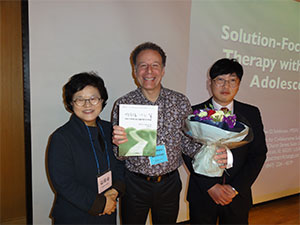
DOING WHAT WORKS: EVIDENCE-BASED COUPLE AND FAMILY TREATMENT APPROACHES FOR ADOLESCENT AND ADULT SUBSTANCE ABUSERS
For decades, many outpatient and inpatient programs that service adolescent and adult substance abusers continue to employ the Twelve Step/Disease model treatment approach in spite of post-treatment relapse rates being as high as 80%! Although couple partners and/or family members may be invited to participate in the substance abusers’ treatment process, the main emphasis tends be more on psycho-education about their diseases, roles, enabling behaviors, working their own recovery programs in Al-Anon, entrenched couple and family problem-maintaining patterns and beliefs are left unchanged, thus setting the stage for substance abusers’ experiencing slips and relapses during and after treatment. Furthermore, numerous psychotherapy outcome studies in the mental health, addictions, and couple and family therapy fields have indicated the efficacy of flexible, integrative treatment approaches that are tailor-fitted to the unique characteristics and needs of substance abusers, their couple relationships, and/or families.
In this “hands-on,” practice-oriented workshop, substance abuse counselors, couple and family therapists, and mental heath professionals will come away with a plethora of empirically-validated treatment approaches and specific therapeutic tools and strategies that have contributed to positive treatment outcomes for substance abusers and their couple and/or family relationships. As a result of attending this workshop, participants will be able to:
- Select and match specific couple or family treatment approaches that best fits the unique needs, preferences, and characteristics of substance-abusing clients
- Utilize the wisdom and expertise of self-changers who conquered their addictions and are flourishing in the world
- Effective engagement strategies for even the most reluctant substance abusers, their partners, and key family members
- Utilize the blueprint for change plan to empower couples and families to design their own roadmaps for treatment success
- Interviewing for change: Selecting and crafting meaningful questions for empowering clients to achieve their goals and to co-create compelling future realities
- Guidelines for working with dual-addicted couples and families presenting with multiple self-destructive behaviors
- One-person couple or family therapy
- Implement couple and family relapse prevention tools and strategies
- Co-constructing change and possibilities with concerned members of the substance abusers’ social ecologies and involved helpers from larger systems
- Run strengths-based therapy groups: Solution-Oriented Parenting and Stress-Busters’ Leadership groups
The workshop format will combine information-rich didactic presentation and videotape examples of major therapeutic tools and strategies.

